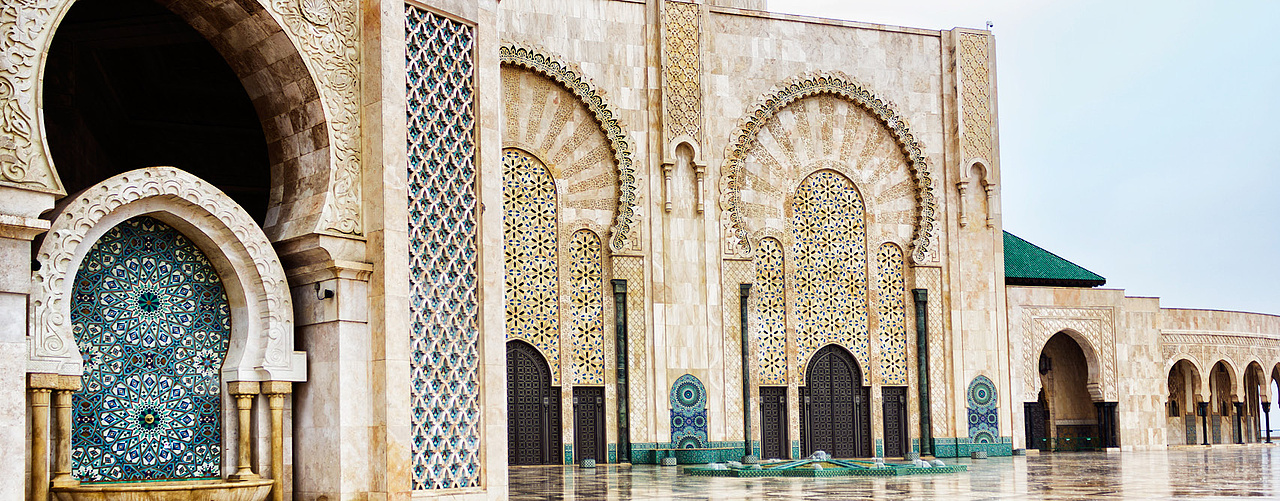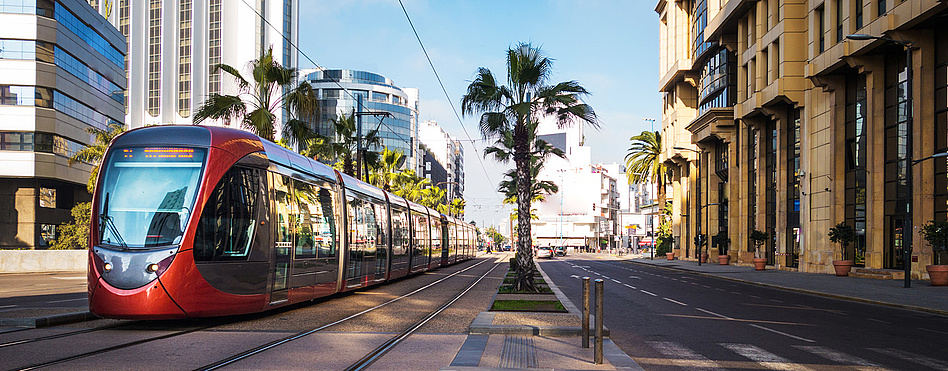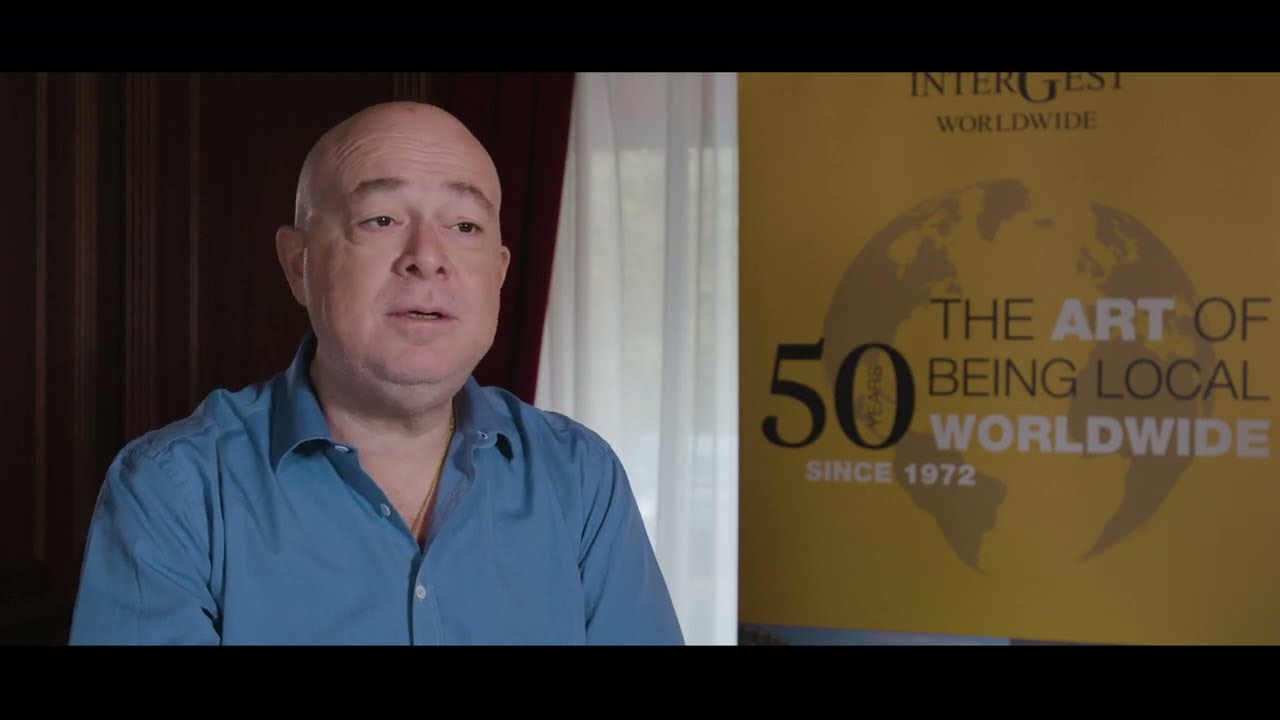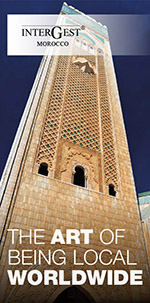
THE ART OF BEING LOCAL
IN MOROCCO
Company formation in Morocco
Morocco in north-west Africa is only geographically separated from Europe by the Strait of Gibraltar. This makes Morocco an important link between Europe and Africa. The country plays an important role for the economy in North Africa. In recent years, Morocco has made political, economic and social progress thanks to comprehensive reforms. The country offers advantages for foreign entrepreneurs, such as tax incentives. As a result, more and more companies are deciding to invest and do business in Morocco.
In order to properly plan the establishment of a company or branch in Morocco and to initiate the appropriate administrative steps, professional advice is important. This is what InterGest Morocco offers you. The company, based in Casablanca, was founded in 2019 to support foreign companies in setting up a business base in Morocco.
Karim Ahniche is Managing Director of InterGest Morocco. He has international experience in media, telecommunications, finance, human resources, pharmaceuticals and business development. He is also Managing Director of AIMS International in Morocco and supports the development of the network in North and West Africa. He is fluent in English, Arabic and French.
WHY SHOULD
COMPANIES
INVEST IN
Morocco?
Follow our series
Important steps for setting up a company in Morocco
Before a company can be founded in Morocco, a number of requirements must be met. These include a valid residence permit in order to be able to legally carry out economic activities in Morocco. This can be applied for either in the form of a work visa or a residence permit for entrepreneurs and investors. It is also necessary to appoint a Moroccan citizen or a legal entity in Morocco to act as managing director of the company. This person is responsible for representing the company locally and fulfilling legal obligations. This is where InterGest Morocco's service comes in and can provide significant advice and support to companies wishing to invest in a business base in Morocco.
Once all the requirements have been met, the process of setting up a company in Morocco can begin. Firstly, a name must be chosen for the company that does not infringe on any existing brands or companies in Morocco. This is followed by the selection of the company form. Various options are available here, such as the limited liability company (SARL) or the public limited company (SA).
The next step is to apply for an extract from the commercial register at the Chamber of Commerce. All relevant documents are checked before the company is registered with the commercial register. After registration, the company receives a commercial register number, which is required for all business transactions.
To register with the tax authorities in Morocco, the company must apply for a tax identification number and regularly fulfil its tax obligations.
Before hiring staff, it is important to check the labour regulations in Morocco. This includes compliance with working hours and laws, the granting of holidays and the payment of social security contributions.
To avoid mistakes and problems when setting up a company in Morocco, it is best to speak to InterGest Morocco in advance. The company assists export-orientated companies and supports them in setting up, designing and managing their own foreign company or branch in Morocco.
Setting up a company in Morocco: The legal framework
One of the most important legal requirements for setting up a company in Morocco is compliance with the Moroccan Commercial Code (Code de Commerce). This law regulates business activities in the country and contains provisions for company registration, shareholder liability, accounting and other aspects of business operations.
Choosing the right legal form is the first step in setting up a company. It depends on factors such as capital requirements, liability risks and tax aspects.
Setting up a company in Morocco requires the creation of articles of association, which define the company's internal rules and procedures. The articles of association must be submitted to the commercial register and approved before the company can start operating.
An important legal requirement is the registration of the company with the relevant commercial register. This step is the basis for officially establishing the company and giving it the legal status of a legal entity. Registration includes the submission of documents such as the articles of association, proof of identity of the founders and information about the company's registered office.
In Morocco, there are certain regulations regarding employment contracts, working hours, minimum wages and social benefits. Entrepreneurs should familiarise themselves with these regulations and ensure that they treat their employees accordingly and fulfil the legal requirements.
InterGest Morocco assists companies in obtaining legal advice to ensure that the company formation complies with the applicable legal and administrative requirements from the outset.
Setting up a business and the tax system in Morocco
Entrepreneurs should take note of the tax and labour regulations in Morocco when setting up a company. The country has reformed its tax system in recent years in order to encourage investment and improve competitiveness.
Morocco has a progressive income tax system in which the tax rates vary depending on the level of income. In addition, there are certain tax concessions and incentives for selected sectors or project types.
Regular tax obligations must be observed. These include the submission of tax returns and the payment of advance payments or social security contributions.
With InterGest Morocco, you have a professional partner for accounting, bookkeeping and tax advice on site. The company offers financial and tax services such as payroll, business process outsourcing, the daily execution of fiduciary administrative work, reporting and controlling.
The different types of corporate structures in Morocco
Morocco offers several company forms to choose from based on the respective business interests and business plans when founding a company.
The sole proprietorship makes it possible to set up your own company without a partner. The owner is fully liable for the debts and obligations of the company. Setting up a sole proprietorship offers flexibility and simplicity, but comes with a liability risk.
The limited liability company (SARL) offers limited liability for the partners. The formation of an SARL requires at least two partners and a minimum capital of 10,000 dirhams (= approx. 2,500 euros depending on the current exchange rate). It is suitable for small to medium-sized companies as it offers simple administration and a clear structure.
The public limited company (SA) is a frequently chosen corporate form for larger companies in Morocco. It requires a minimum capital of 300,000 dirhams (= approx. 75,000 euros depending on the current exchange rate) and at least five shareholders. The SA offers shareholders limited liability and allows them to raise capital through the sale of shares. This structure is suitable for companies that wish to be listed on the stock exchange.
Branch office: A foreign company can also open a branch office in Morocco. This option allows the parent company to expand its business to the Moroccan market while maintaining the legal link with the parent company. The branch is subject to the laws and regulations of Morocco and is liable for its own debts and obligations.
A joint venture is a co-operation agreement between two or more companies to jointly establish a new company in Morocco. This allows the companies involved to share their resources and expertise. In this way, the risks and burdens of setting up a company can be minimised.
InterGest Morocco advises you on the basis of many years of experience in the Moroccan business environment when setting up a company and thus facilitates your entry into a new market.
Government support and subsidies for foreign investment in Morocco
In recent years, the Moroccan government has taken measures to facilitate the investment process and attract foreign investors. For example, it has founded the Investment Promotion Agency (Agence Marocaine de Développement des Investissements - AMDI). This agency has the task of supporting foreign investors in their projects and helping them to realise their investment plans. The AMDI offers services such as providing information on investment opportunities, the business climate, the legal framework and market prospects in Morocco.
The Moroccan government favours incentives and tax benefits for foreign investors. This includes the possibility of tax exemption for a period of five to eight years - depending on the location and type of sector invested in. There are specific incentives for sectors such as exports, agriculture and renewable energies.
One instrument for promoting foreign investment in Morocco is the creation of special economic zones. They offer foreign companies advantages such as improved infrastructure, lower administrative costs and faster processing of authorisation procedures. In these zones, foreign investors can benefit from tax concessions and financial incentives.
The Moroccan government has concluded various bilateral and multilateral agreements with countries and international organisations to facilitate trade and investment. These agreements create a legal framework that offers foreign investors additional security and protection.
The challenges and risks of setting up a company in Morocco
One of the biggest challenges in Morocco is the bureaucratic hurdles. The process of setting up a company can be time-consuming and complex for foreign investors. It is important to find out about local legal requirements, authorisation procedures and tax regulations in advance to avoid unnecessary delays.
Although Morocco has made considerable efforts to improve the business environment in terms of legal certainty, there are still some obstacles, for example when it comes to protecting intellectual property. Thorough research and legal advice are therefore essential to prevent potential legal risks.
Cultural differences and language barriers pose a challenge. Morocco is a country with a rich cultural diversity. It is important to respect and understand these cultural differences. Language barriers must also be taken into account, as Arabic is the official language. It makes sense to hire local employees or consultants to successfully run the business in Morocco.
Although Morocco is continuously investing in its infrastructure, there are still areas that need to be improved. Delays or problems with electricity, transport or communication can affect business operations and should therefore be taken into account when choosing a location.
In order to anticipate adversities when setting up a company in these areas, you should arrange a non-binding initial consultation with InterGest Morocco. Managing Director Karim Ahniche and his team know the business environment in Morocco inside out. InterGest Morocco can help you with company formation, administration, financial services including bookkeeping, tax advice, payroll accounting, dunning and debt collection, commercial project management, recruitment and administration, and much more.
One thing is certain: Morocco offers many opportunities for entrepreneurs. The country has a growing middle class, a well-educated labour force and access to markets in Africa, Europe and the Middle East. Morocco benefits from international agreements that facilitate trade and encourage investment. With thorough preparation, effective market research and a clear business strategy, these opportunities can be capitalised on. Contact InterGest Morocco for comprehensive advice on your route to Morocco.






